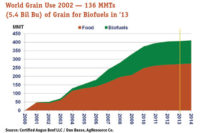We’ve all seen the tremendous buzz around “plant-based.” Be it on TV, in magazines, scrawled across social media feeds or somewhat bizarrely trumpeted as the hot new thing by multiple fast-food chains, plant-based meat alternatives are being hyped as save-the-day innovations ad nauseum. What’s really going on here? Has there been a sudden surge of veganism across the country? Not really. According to a 2019 study by the Vegetarian Resource Group, just 4 percent of U.S. consumers are strict vegetarians, with half of that group consisting of those who consider themselves vegan (2 percent). Those rates have remained relatively stable for many years.
Here’s something we do know for sure: Consumers want animals to be treated well and are willing to pay more for products from companies that deliver on that promise. Over the last decade, for example, the egg industry experienced a wave of change led by consumers’ demand for cage-free eggs (pasture-raised, all the better). Following suit, I believe this alleged plant-based revolution is a reflection of consumers’ ever-expanding desire to make purchase decisions that reflect their values. Ideally, they want to eat healthy, treat animals humanely and protect the environment for future generations. Much of this is the promise of plant-based messaging. The problem, however, lies in the assumption that plant-based alternatives meet these ideals simply because “plant” is in the product name — a word consumers strongly associate with wholesome, close-to-nature food and small family farms.
We know to look deeper. We can flip over the packages of plant-based meat alternatives and plainly see that they’re among the most highly processed foods in the store. The Impossible Foods burger has 21 ingredients including methylcelluse, a thickening agent that’s also used in shampoo, toothpaste, glue, tile adhesive and laxatives. It’s made by pulling cellulose from plant fiber into a solution of sodium hydroxide to heat it, followed by a bath of methyl chloride. Lab chemistry is also needed to produce soy protein isolate, one of the main ingredients in plant-based foods: soybeans are treated with hexane, a highly flammable solvent made from crude oil that breaks apart the soy into various components.
Here would be a good place for the welcomed reminder that organic grass-fed burgers have one ingredient: beef.
Impossible Foods and Beyond Meat’s burger patties also have five times more sodium than real beef. Apparently, all that extra lab work and added sodium comes at a greater financial cost as well — Beyond Meat’s patties typically retail for $12 per pound, almost double the cost of Organic, grass-fed ground beef.
According to plant-based messaging, not only will your health thank you for making the switch, but so will the planet, thanks to a lower impact on the environment than meat production. We’ve all heard that methane from cows is causing Earth to warm up. It seems logical, then, that replacing beef with plants will do more good, right? Wrong. If the other 98 percent of U.S. consumers were to become strictly vegan and stop eating meat, greenhouse gas emissions would decline by a mere 2.6 percent, according to a USDA Agricultural Research Service report summarized in ScienceDaily. And here’s what’s not said by those touting the “end of animal-based meat”: The massive increase in monocropped plants required to make all the plant-based meat alternatives would be coupled with an equally massive increase in the use of fossil-based pesticides, herbicides and fertilizers. Not to mention the use of GMO seeds and the glyphosate-based pesticides they require. Good luck finding enough arable land to plant this volume of crops in the first place.
Perhaps the biggest surprise we found when looking deeper into the plant-based phenomenon is that the hype is not translating to the cash register. Plant-based meat represents just 1.4 percent of total meat dollar sales in grocery and mass retailers, according to an IRI report released November 2019. And while plant-based meat’s 10.6 percent growth in annual dollar sales seems impressive, it lags well behind the 16.1 percent growth in annual dollar sales of organic grass-fed beef over the same time period. Three of the top four brands offering plant-based meat — Morningstar, Boca and Gardein — have been around for more than a decade and exist largely in the freezer case. Beyond Meat grew impressively, more than doubling its sales to $75 million. But that figure amounts to just one-sixth of one percent — or .0016 — of all meat sales. That’s a mighty small teapot.
Despite all of this, a major national retailer recently announced it was putting a 3-foot set of plant-based meat alternatives in the fresh-meat case of 60 stores to determine whether the change should be rolled out nationwide. That’s 3 fewer feet of space for animal-based products, including those delivering higher growth rates than the over-hyped, over-processed and over-promised plant-based meat.
Perhaps we’ve reached a tipping point. I’ll ask my earlier question again: What’s really going on here? I think the meat industry has nobody to blame but itself. For years, the changing values of our consumers have been ignored. Pink slime and feeding skittles to cattle in feedlots was brushed off as, at best, off-putting to the people buying our products. We saw the egg industry’s production system get turned on its head by the demands of consumers, yet most meat companies dug in their heels and stuck their heads in the sand thinking, “It won’t happen to me.”
But there are solutions. First, I encourage the entire meat industry to stop sitting on its hands and join the building wave of criticism of plant-based meat alternatives. Whether it be Whole Foods co-founder John Mackey, Chipotle, doctors, scientists or the New York Times, there is a growing drumbeat against the false promises of plant-based meat.
Second, I urge the industry as a whole to listen to its consumers and deliver what they really want. They want to do good. They want to be healthier. They want animals to be treated humanely. They want to lessen their impact on the environment. They also lead busy lives and make hundreds of decisions a day. Selecting a product they believe is “good for you and the planet” helps them align these daily decisions with their values. Discovering a product that meets all those values and gives them the convenience they need and the taste experience they desire could make plant-based meat yesterday’s news.
As an industry, I believe we need to deliver on these ideals and communicate them to consumers, with the best path forward being a significant expansion of the production of pasture-based meats. Science has shown that regenerative agriculture, especially pasture raising beef on lands that would otherwise not support agricultural crops, reduces the environmental impact down to near zero. Animals raised on pasture are also happier, healthier and higher in nutrients than those from intensive feeding operations. That is the “better for you, better for the animal and better for the planet” that consumers are looking for.
This could all be a tempest in a teapot, but if we don’t respond by changing and innovating to meet the needs of today’s consumer it could also be our “cage-free egg moment.” Ethically raised, pasture-based meat is the trump card that best delivers on consumers’ needs, and I encourage the industry to proactively increase its production and promotion. The meat industry also needs to look to value-added products that deliver great-tasting, convenient, easy-to-prepare foods that are made with the simple, real and delicious ingredients consumers desire. Real innovation based on consumer insights is what’s needed to capture the shelf space that we are losing — or have already lost — to plant-based meat.
That’s not only good for people, animals and the planet, it’s good for business, too. NP









Report Abusive Comment